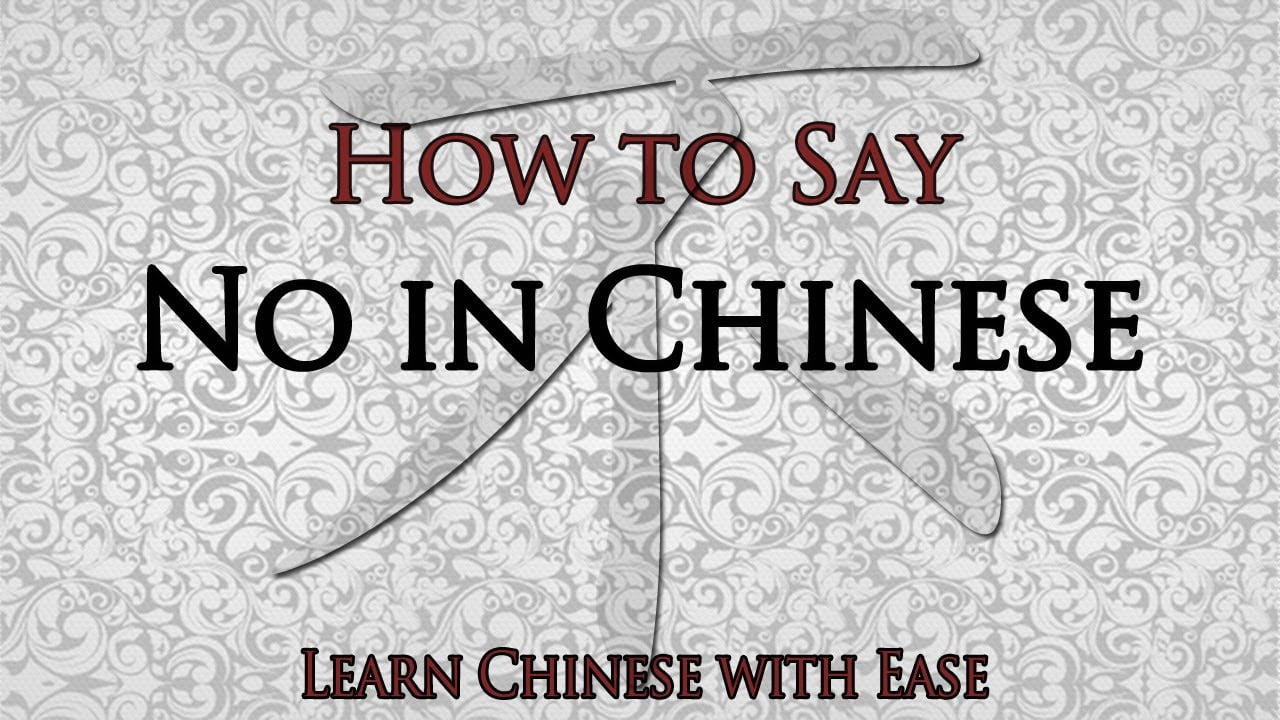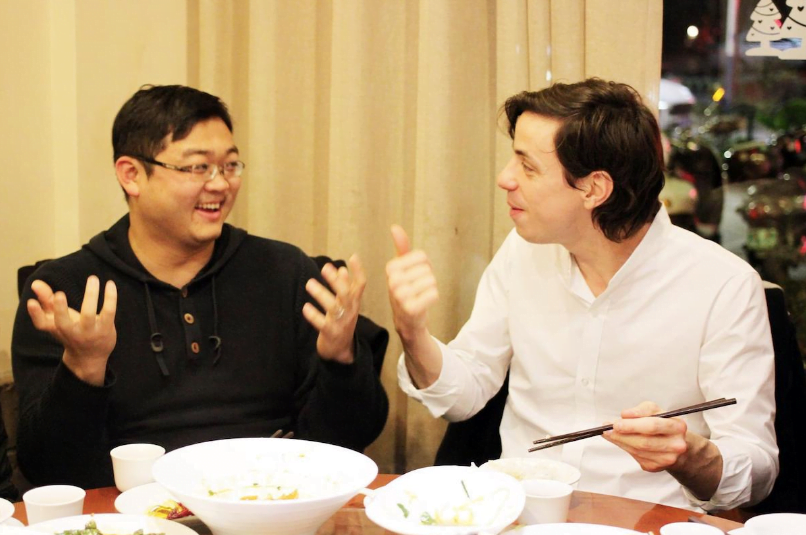Physical Address
304 North Cardinal St.
Dorchester Center, MA 02124
Physical Address
304 North Cardinal St.
Dorchester Center, MA 02124

Learn a life rule, if you want to say ‘NO’ then never end up saying maybe, or I’ll try. It’s wrong. You can say ‘No’ in several other sentences. For instance, if you want to reject something, then you can use short and sweet words to express rejection while making others feel good about it. When learning the Chinese language, always communicate from a cultural point of view. Shy from making direct rejections as it makes Chinese lose face. If you happen to hurt the feelings of a Chinese, here is how to say I am sorry in Mndarin
There is no direct translation of the English word ‘NO’ in Chinese. As there is no single word that is adequate to translate the word “No.” But most of the non-native Chinese speakers use the 不 which is the common way to say ‘NO.’
But we can’t use this word all the time. In Mandarin, there are many other ways to communicate negative responses. We have prepared a comprehensive list of useful Chinese phrases to help you pick up the Chinese language faster.
One of the most common ways to say “NO” is to use 不是 (bùshì) when disputing the truth of something or disagreeing with someone. The literal translation of this word in English is “to not be.” Or you can use it when someone asks a question that requires confirmation. You can use this word to indicate that it is not true.
Let’s consider an example:
A: 你是美国人吗?
Nǐ shì Měiguórén ma?
Are you American?
B: 不是
Bùshì
No, I’m not.
There is another phrase you can use to indicate “no” is 不是的 (bùshìde). It sounds informal and can be used in various situations to indicate no
I think examples make it easy to understand the words in different situations. Isn’t it?
For example:
A: 这个礼物是给宝宝的吗?
Zhège lǐwù shì gěi bǎobǎo de ma?
Is this gift for the baby?
B: 不是的
Bùshìde.
No, it isn’t.
It is the most famous word in Chinese to say NO. Native Chinese speakers quickly understand this word as means no when they listen 不 (bù). Most of the time, this phrase shows anger or to sounds quite abrupt. Chinese native speakers don’t use this word often because it shows the negative behavior of the person.
If you want to show your unwillingness, you can use this word. For example:
A: 你爱不爱她?
(Nǐ ài bù ài tā?)
Do you love her or not?
B: 我不爱她
(Wǒ bù ài tā.)
I don`t love her.
Another example:
我不去上海了
(Wǒ bú qù shànghǎi le.)
I won`t go to Shanghai anymore.
If you want to express an emotion, you will use like that
你不可以这样做
(Nǐ bù kěyǐ zhèyàng zuò.)
You cannot do so.
Or,
这里不能抽烟
(Zhèlǐ bùnéng chōuyān.)
Smoking is not allowed here.
The literal meaning of 不对 (bùduì) in English is “incorrect” or “not right.” If you do not agree with someone, or you have your own opinion, you can use this phrase.
Let me example more with a clear example:
Wǒ juédé Zhōngguó de gǔzhèn dōu hěn piàoliang.
I think all ancient Chinese cities are beautiful.
Bùduì, yǒu yīxiē hěn shāngyèhuà.
No, some of them are touristy.
If someone asks for permission or request someone to do something, you can use this word. It shows the negative impact that means ‘not okay’ or ‘not at all right.’ It is pronounced with the raising of the tone.
我可以用你的信用卡吗?不行.
wǒ kě yǐ yòng nǐ de xìn yòng kǎ ma?bù xíng.
Can I use your credit card? No.
Another example:
Nǐ de chēzi jiè wǒ yīxià?
Can you lend me your car?
Bùxíng.
No.
What to use for a stronger negative answer?
It is another phrase used to say no. Bù kě yǐ is used in a situation where someone asks for permission. The literal meaning of this word is “can’t” or “may not.” This phrase is used to negatively respond to a question or a request.
A: 这里可以拍照吗?
Zhèlǐ kěyǐ pāizhào ma?
Can I take photos here?
B: 不可以。
Bù kěyǐ.
No, you can’t.
这里可以吸烟吗?不可以
zhè lǐ kě yǐ xī yān ma?bù kě yǐ.
Can I smoke here? No, you can’t.

不可能 (bù kěnéng), this phrase is used for the stronger negative answer. It consists of negative words that show a strong negative response. The literal meaning of this phrase means “no way” or “not possible.” You can use this phrase when you are completely out of question, or if you want to reject the idea.
For instance,
A: 听说你要结婚了.
Tīng shuō nǐ yào jiéhūn le.
I heard you’re going to get married.
B: 不可能,我都没有男朋友
No, that’s impossible, I don’t even have a boyfriend.
Bù kěnéng, wǒ dōu méiyǒu nánpéngyǒu.
Another one:
你可以一个星期内减肥30公斤吗?不可能.
nǐ kě yǐ yī gè xīng qī nèi jiǎn féi 30 gōng jīn ma?bù kě néng.
Can you lose 30 kg within a week? Impossible.
Depending upon the context or situation, you can use different phrases to say NO. If you are considering a request inappropriate, you can use 没门儿!méi mén er! The literal meaning of this phrase is “No way.”
Let me make your concept clearer by supporting an example:
我可以借更多的钱吗?没门儿!
wǒ kě yǐ jiè gèng duō de qián ma?méi mén er
Could I borrow some more money? No way!
Or,
你可以把信用卡借给我吗?不可能.
Nǐ kěyǐ bǎ xìnyòngkǎ jiè gěi wǒ ma? 不可能.
Can you lend me your credit card? No way.
It is not fair to always say no harshly or roughly. But you can control the situation by using soft words. There is a phrase 不用 (bùyòng) which is used to say ‘No’ politely. The literal meaning of this word is “no use” or “not use.”
The actual meaning of this phrase is ‘No thanks.’ It is used to indicate light refuse towards people. This phrase is pronounced with a falling tone.
你需要帮忙吗?不用。
Nǐ xūyào bāngmáng ma? Bùyòng.
Do you need help? No, thanks.
我送你回去吧。不用,不用。
Wǒ sòng nǐ huíqù ba. Bùyòng, bùyòng.
Let me take you home. No, thanks.
有 (méiyǒu) is the most common word that is used to answer ‘NO.’ it is used to answer simple questions. The literal translation of this phrase means “not have.” It is used to tell someone that you don’t have this thing.
For example:
你有笔记本电脑吗? 没有
Nǐ yǒu bǐjìběn diànnǎo ma? Méiyǒu.
Do you have a laptop? No (I don’t).
Another example:
你吃过臭豆腐吗?没有
Nǐ chīguò chòudòufu ma? Méiyǒu.
Have you ever eaten stinky tofu? No (I haven’t).
If you have some basic knowledge of Chinese, you can easily learn other ways to say ‘NO.’ Having a basic knowledge of Chinese will help you respond appropriately. You can use some other verbs with a simple ‘NO’ to make the conservation polite.
Nǐ huì yòng kuàizi ma? Bù huì
Can you use chopsticks? No, I can’t.
nǐ xiǎng qù jiā zhōu ma? wǒ bù xiǎng.
Do you want to go to California? I don’t want to.
nǐ néng zǎo diǎn lái ma? wǒ bù néng.
Can you come earlier? Sorry. I can’t.
Nǐ yào chī jīzhuǎ ma? Bùyào.
Do you want to eat some chicken feet? No, I don’t (want to).
Nǐ xǐhuān zhè jiàn yīfú ma? Bù xǐhuān.
Do you like this piece of clothing? No, I don’t (like it).
The formal way to say No is commonly used in written Chinese.
For example:
问题在你,而非她
Wèntí zài nǐ, ér fēi tā
You are the problem, not her.
无人生还
Wú rénshēng huán
Nobody comes back alive.
我否定了她的计划
Wǒ fǒudìng le tā de jìhuà.
I denied her plan.
| Hànzì | Pīnyīn | Definition |
|---|---|---|
| 不是 | bùshì (pronounced “búshì”) | no/incorrect |
| 不是的 | bùshìde (pronounced “búshìde”) | no/incorrect |
| 不 | bù | no (abrupt, can be impolite) |
| 不对 | bùduì (pronounced “búduì”) | no/incorrect |
| 不行 | bùxíng | no (can be impolite) |
| 不可以 | bù kěyǐ | no, [you] can’t/may not |
| 不可能 | bù kěnéng | impossible/no way (can be impolite) |
| 不用 | bùyòng (pronounced “búyòng”) | no, thanks (polite) |
| 没有 | méiyǒu | no |
| 不好意思 | bù hǎoyìsi + explanation | sorry (polite) |
| 抱歉 | bàoqiàn + explanation | sorry (polite) |
| 不会 | bùhuì (pronounced “búhuì”) | No, [I] can’t |
| 不要 | bù yào (pronounced “búyào”) | No, [I] don’t want to/don’t want it |
| 不喜欢 | bù xǐhuān | No, [I] don’t like it |
If you are a non-native Chinese speaker, you need to master the skill of learning the basics. If you don’t know the several ways to say NO, you may feel disrespectful. It is important to master the different ways to say “no.” You can also click here to learn about saying Yes in Chinese
By watching the different Chines TV shows, you can improve your speaking skills. You can communicate with different people online to improve your verbal expression. The most basic way to say ‘no’ is to use the word bù or méi. Check out more about our programs if you are Looking to intern in China or Study Abroad
